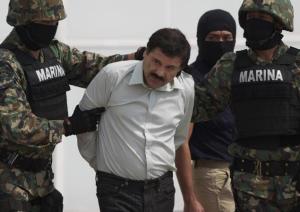Joaquín ‘El Chapo’ Guzmán was finally caught on Saturday. Captured in his high-rise condo in Mazatlán, the world’s most powerful drug lord must now face Mexico’s justice system. Years of profiting off of the illegal trade of cocaine, methamphetamine, and heroine around the world must be accounted for. But will the courts succeed in bringing justice? Will corruption enable the powerful captive to continue his trade behind the walls of his prison? Or will he escape again like he did in 2001?
Thinking about this case leaves me feeling a little surprised. I wonder how one man can have become so immune to the damage he has inflicted on countless lives, and not feel remorse. He seems to have become dehumanized by the very business of which he is ‘lord’. Yet, as one article describes it, “the cartel has transcended the man” (Thompson, G. & Archibold, R.C. (Feb.25, 2012) El Chapo’s arrest unlikely to break Mexican cartel, www.nytimes.com). His business will carry on with or without him.
Think about that word ‘dehumanize’. It’s a worrisome word. Not that the drug world is the only environment in which the corruption occurs. The word conjures up visions of the worst of humanity’s crimes—Nazi concentration camps, wars, slavery, sweatshops. Perhaps thinking of its antithesis is a better place to start. What does it mean to be truly human?
Let’s look back into the Genesis record of God creating the first humans. Do you remember how it’s put?
“Then God said, “Let us make man in our image, in our likeness, and let them rule over the fish of the sea and the birds of the air, over the livestock, over all the earth, and over all the creatures that move along the ground…God saw all that he had made, and it was very good.” That’s in the very first chapter. There’s much to be gleaned from observing beginnings. God’s impression of the unique creature we call Homo sapiens was that ‘it was very good’. So what is it that was good? What is it that makes us fully, uniquely and by God’s design human? And sadly, what is it that weakens, damages and even dehumanizes that design?
Something about God’s image, imparted to us humans at our creation, defines the core of our God-imparted humanity. It’s something central to our being that can flourish or be diminished as a result of choices we make. Something that describes us as fully human, or else be described as inhuman, dehumanized, inhumane.
We are charged with the enterprise of ruling the earth. God, Ruler of the Universe, makes earth a domain where His highest creature, man, will rule much like his Maker. So how does God rule? With indifference, impotence or noninterference? Or with benevolence, wisdom and power? Those with a correct understanding of how God describes Himself in His Word observe that His attributes detail the perfect ruler—all-knowing, all-loving, all-wise and all-powerful. He rules with complete justice.
I submit that we, as image-bearers of God, are called to implement our humanity primarily by the practice of justice. Within every relational ecosystem we best express our humanity by being just. A just human is truly human. And a just human reflects the image of God.
So how do we practice justice? By ensuring that drug lords like El Chapo go to prison? I don’t know about you, but I’m not in that line of work. However, does this release me from the responsibility of practicing justice?
Isaiah 1:17 says, “Learn to do right; seek justice. Defend the oppressed. Take up the cause of the fatherless; plead the case of the widow.” While the practice of justice is integral to real humanity, it’s a skill many of us have failed to develop. We need to relearn it. We need to seek it. It means looking out for the needs of the poor, the disenfranchised, the lonely and the socially outcast. It means putting ourselves into situations of discomfort for the sake of those who are hurting. We may have to delve deeper than we’re used to in order to find someone in need of justice. This is what it means to “love your neighbour as yourself”. There is nothing passive about it. But then again, there was nothing passive about God creating us “in his image”, was there?
So we have a task today, do we not? We must begin to learn what it means to be just. It’s not an academic subject, though; so don’t spend too much time in the books over it. It’s exceedingly practical. It might mean listening to your neighbour’s complaints, shoring up your side of the fence that’s causing them some grief. Or it might mean sponsoring a child through Compassion Canada. It might mean stepping back from your enjoyment of buying inexpensive clothes made in China, or chocolate harvested by child-prisoners in Uganda. It might mean voting to allow a recovery house to be built in your neighbourhood, or being honest on your tax return. You get the idea, and so do I. Now it’s time to get on with it. It’s a high calling, but we were created for it: get out there and be just, human.
(Photo credit: Eduardo Verdugo (AP)

